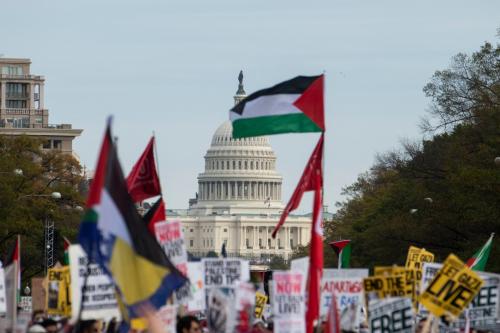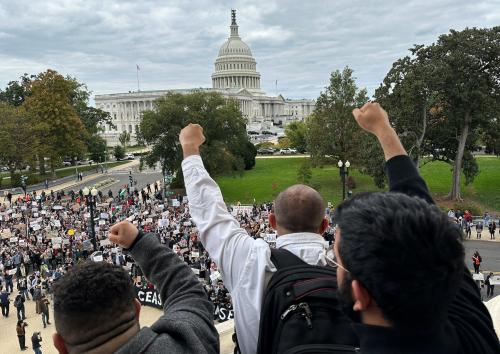The scale of horror inflicted on civilians in the war in Israel and Gaza, and the central role that the United States has played in backing Israel in the war, have raised the issue’s profile in American politics and the American public discourse. Similarly, the full-scale Russian invasion of Ukraine in February 2022, the ongoing war, and the American backing of Ukraine have elevated this issue in American politics. At the time of this writing, Congress was still considering the passing of an additional $95 billion aid package that includes funds for both Israel and Ukraine.
Has our public discourse been hospitable to frank conversations on those critical issues?
To find out, I designed a few questions in our University of Maryland Critical Issues Poll with Ipsos, which was fielded January 29-February 5, 2024, among 1,891 respondents using Ipsos’s probability-based KnowledgePanel with a margin of error of 2.4 percent.
It turns out that there are substantial differences in the way Americans discuss each of these issues, with nearly three times as many Americans saying they feel the need to be extra careful when publicly discussing the Israeli-Palestinian issue as those saying the same about the Russia-Ukraine war.
The poll also found that most Americans who think Israeli actions were not justified say the United States is at least partly responsible for Israeli military actions in Gaza, and that more Democrats and independents say Israel has gone too far in Gaza, while more Republicans say Israel is simply defending itself.
Here are six key takeaways.
First, when asked if they feel a need to be extra careful when discussing the Israeli-Palestinian issue outside their homes, 41 percent of respondents say the issue does not apply to them—hardly surprising given that many Americans are not watching this issue closely or feel informed enough to discuss it. At the same time, 30 percent say they do feel the need to be more careful, including 38 percent of Democrats and 26 percent of Republicans. The degree of concern among Democrats is particularly notable: If one excludes those saying the issue does not apply, 63 percent of Democrats say they feel the need to be more careful, compared to 41 percent of Republicans and 51 percent of all respondents.
In comparison, fewer respondents say the issue of the Russia-Ukraine war does not apply to them (36 percent). A majority say they do not feel the need to be more careful, including 54 percent of Democrats and 57 percent of Republicans. By contrast, only 11 percent say they are more careful, including 10 percent of Democrats and 11 percent of Republicans. Excluding those who say the issue does not apply, 17 percent of respondents say they are more careful (including 16 percent of both Democrats and Republicans), while 82 percent say they do not feel the need to be more careful (including 84 percent of Democrats and 83 percent of Republicans).
Second, on Israel/Palestine, Americans are far more concerned about criticizing Israel and the Palestinians than they are about criticizing U.S. policy. In contrast, on Russia and Ukraine, respondents are more concerned about criticizing U.S. policy than Russia or Ukraine. Among those who say they feel the need to be more careful when discussing Israel/Palestine, only 18 percent are concerned about criticizing U.S. policy, compared to 30 percent who are concerned about criticizing Palestinians and 34 percent who are concerned about criticizing Israel. Among Americans who say they feel the need to be more careful when discussing Russia and Ukraine, one-third of respondents say they are concerned with criticizing U.S. policy, compared to criticizing Russia (17 percent) or Ukraine (18 percent).
Third, Democrats, who tend to express more reluctance to speak publicly about the Israeli-Palestinian issue than other respondents, tend to be mostly concerned about criticizing Israel (44 percent) compared to 19 percent who worry about criticizing the Palestinians and 18 percent who worry about criticizing U.S. policy. In contrast, Republicans worry more about criticizing the Palestinians (43 percent) than Israel (18 percent) or U.S. policy (24 percent).
Fourth, the partisan divide on discussing Israel/Palestine is much larger than the partisan divide on Russia and Ukraine. Looking first at those who feel the need to be more careful outside their home, there is a 12 percentage-point difference between Republicans and Democrats when discussing Israel/Palestine whereas with Russia-Ukraine, there is only a 1 percentage-point difference. Further, there is a large divide between Democrats and Republicans who say they are concerned about criticizing Israel (26 percentage points) and criticizing Palestinians (24 percentage points). On criticizing U.S. policy, there is a 7-percentage-point divide between Democrats and Republicans. Comparatively, there is only a 3 percentage-point difference between Democrats and Republicans who are concerned about criticizing Russia; a 14-point difference between Democrats and Republicans who are concerned about criticizing Ukraine; and a 10-point difference between Democrats and Republicans who are concerned about criticizing U.S. policy.
Fifth, concerns about public discussion of the Israeli-Palestinian issue are correlated with the degree to which respondents feel Israeli actions in Gaza were justified or not justified.
To start with, when we asked whether Israeli military actions in Gaza were justified or not, 42 percent of respondents say they do not know enough to have an opinion, while one-third say Israeli actions were justified and a quarter say they were unjustified. The partisan differences were huge: While 15 percent of Democrats say Israeli actions were justified and 42 percent say they were unjustified, a majority of Republicans say they were justified and 7 percent say they were not.
Respondents who say Israel’s actions in Gaza are not justified are more likely to say they feel the need to be careful when speaking about Israel/Palestine than those who say Israel’s actions are justified. Among those who say Israel has gone too far and its military actions are not justified, 47 percent say they feel the need to be more careful when speaking outside the home (including 52 percent of Democrats and 39 percent of Republicans). Among those who say Israel is defending its interests and its military actions are justified, 35 percent say they feel the need to be more careful, including 49 percent of Democrats and 30 percent of Republicans.
When looking at what respondents feel the need to be most careful about, among those who say Israel is justified, 57 percent say criticism of Palestinians, 17 percent say criticism of Israel, and 17 percent say criticism of U.S. policy. Among those who say Israel is not justified, 8 percent say criticism of Palestinians, 59 percent say criticism of Israel, and 19 percent say criticism of U.S. policy.
Sixth, among those who say the United States was at least somewhat responsible for Israel’s military action in Gaza, a majority say they feel the need to be careful when speaking about the Israeli-Palestinian issue, with more than two-thirds of these respondents say they are concerned about criticism of Israel.
Among those who said Israeli actions are not justified, 53 percent, including 57 percent of Democrats and 53 percent of Republicans, say that the United States is “somewhat” or “a great deal” responsible for Israel’s military actions in Gaza.
Among those who say the United States was a great deal or somewhat responsible, a majority say they feel the need to be careful when discussing the Israeli-Palestinian issue, compared to just over one-third of those who say the United States is only a little or not at all responsible. A majority of Democrats and Republicans who say the United States is at least somewhat responsible feel the need to be careful, compared to 36 percent of Democrats and 27 percent of Republicans who do not say the United States is responsible.
Looking at those who say the United States is at least somewhat responsible, 69 percent say they are careful about criticism of Israel, including 69 percent of Democrats and 44 percent of Republicans; however, 44 percent of Republicans say they are cautious about criticizing U.S. policy (compared to just 13 percent of Democrats and 14 percent of respondents overall). Only 4 percent of respondents say they are concerned about criticizing Palestinians, including 5 percent of Democrats and no Republicans. Among those who say the United States was not responsible, 42 percent say they are concerned about criticizing Israel (including 41 percent of Democrats and 50 percent of Republicans), while 28 percent say they are concerned about criticizing U.S. policy, including 24 percent of Democrats and 25 percent of Republicans. Only 13 percent of respondents are concerned about criticism of Palestinians, including 21 percent of Democrats and no Republicans.
Conclusion
Much of the attention regarding public conversations about the Israeli-Palestinian conflict and the war in Israel and Gaza has gone to the issues of media coverage and academic campuses, but not to what the American general public may be experiencing, as the war has persisted for nearly five months with significant U.S. involvement. The findings show a higher concern among Americans than one might expect given that we are in an election year where the Israeli-Palestinian issue is far from being a top public priority. These findings stand in contrast with Americans’ comfort level in discussing the Russia-Ukraine war, which has also been a prominent foreign issue in our public discourse for the past two years. It is notable that even a large majority of scholars of the Middle East tend to self-censor professionally on this issue, mostly on criticism of Israel. These trends could be partly attributed to the perhaps unique handling of the Israeli-Palestinian issue in American political discourse. As noted by Ben Rhodes, the former deputy national security advisor under President Barack Obama, the Arab-Israeli issue is addressed as if it were a key domestic issue, and in that sense, is perhaps like no other foreign policy issue.
The Brookings Institution is committed to quality, independence, and impact.
We are supported by a diverse array of funders. In line with our values and policies, each Brookings publication represents the sole views of its author(s).









Commentary
Americans feel the need to be extra careful when discussing Israel-Palestine
March 8, 2024